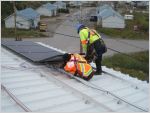
Photo: Emily He, Pembina Institute
Remote communities across Canada are taking on the important work of transitioning their energy grids off diesel and onto cleaner, more reliable, energy. For these communities – the majority of whom are Indigenous – a clean energy transition is a time consuming and expensive challenge requiring sustained collaboration with federal, territorial, and provincial governments as well as utilities, regulators, and the private sector.
As we approach Budget 2024, we’re taking time to outline the important role of the federal budget in advancing the clean energy transition in remote communities. We likewise highlight two key areas of work we’re looking forward to learning more about this spring.
What can the federal budget do for remote communities?
As remote communities and clean energy proponents work to displace diesel, they are met with distinct barriers, including restrictive business cases which often do not cover the full costs associated with project development. For this reason, the federal government has historically played a prominent role in providing necessary support to communities undertaking energy transition. Without their support, many systemic barriers — and their resulting financial shortcomings to clean energy progress in remote communities — are very difficult to overcome, stalling opportunities for remote communities to participate in the clean energy transition. An array of support mechanisms are critical for addressing these impediments to clean energy development and diesel reduction.
Right now, communities have access to a patchwork of federal grant and funding streams including capacity building programs, direct funding, and low risk loan pathways. Among these include funding initiatives such as the Low Carbon Economy Fund (2017), Wah-ila-toos (2022), the Smart Renewables and Electrification Pathways Program (2021), and the Smart Grid Program (2018) – each driven by commitments made in previous budgets and plans such as the Healthy Environment and a Healthy Economy plan (2020). These efforts have also been complimented by dedicated and derisked loans from the Canada Infrastructure Bank’s Indigenous Community Infrastructure Initiative (providing low-interest loans for at least $5 million to up to 80% of total project capital cost with a cap of $100 million) and the Indigenous Equity Fund (lending capital to Indigenous communities to enable equity stakes in projects). Together, these commitments support remote and Indigenous clean energy initiatives and help address chronic barriers to clean energy action such as human capacity deficits, high and fluctuating costs of equipment, skilled labour shortages, the persistence of low Power Purchase Agreement (PPA) rates, and more.
While communities have access to an array of federal programs which aid and strengthen their diesel reduction efforts, it is important to note that many of these programs are often quickly over-subscribed, chronically underfunded, or aren’t recapitalized during annual budgets. The consequences of these deficits often mean that community projects cannot advance diesel reduction at the pace required to meet national, provincial, and territorial goals. The momentum of the clean energy transition in remote communities is thus closely tied to the funding commitments the federal government is willing to make to support communities through the transition.
What we’re looking out for in Budget 2024
Indigenous Loan Guarantee
In Budget 2024, we expect to receive more information about the long-awaited Indigenous Loan Guarantee Program . The program, previously announced as part of the 2023 Fall Economic Statement (FES 2023), is a strategic initiative aimed at increasing Indigenous groups' access to affordable capital to facilitate Indigenous equity ownership in major projects. Although FES 2023 didn't release details regarding the financial support or implementation framework for the Indigenous Loan Guarantee (beyond the role of the Canadian Infrastructure Bank in executing the loans), it's clear that the program serves as a pivotal mechanism to lowering access to capital barriers for Indigenous communities – a longstanding issue which has considerably slowed the clean energy transition in remote communities.
While this approach to economic reconciliation represents new territory for the federal government, it's worth noting that Alberta, Saskatchewan, and Ontario have already implemented programs (British Columbia has also recently announced its intention to create a similar program), offering valuable practical insights and potential best practices for effective execution and management.
It is important to note that the program is expected to support “major resource projects” which may limit the programs’ applicability to remote communities in energy transition depending on the cost and scale of the project. For those remote communities that would qualify for the loan, certain challenges relating to upfront costs (e.g. down payments for major suppliers), unrealistic repayment timelines, and more, could – as they do currently – act as barriers to access to the program. In addition to major project funding, we hope the program will directly address these existing inequities for eligible remote communities and improve longstanding funding issues faced by Indigenous project proponents.
Capacity building and knowledge exchange
As momentum for clean energy continues to build, we also hope to see ongoing support for capacity building and knowledge exchange among and for remote communities. Investments made in the 2023 budget towards abundant and low-cost clean electricity, particularly the recapitalization of SREP and the Smart Grid Program, were welcome commitments to the clean energy transition in remote communities. These commitments are a helpful foundation upon which individuals and communities have been able to strengthen skills, develop expertise, and make clean energy more affordable for remote households – but there is much more support required to meet federal, provincial, and territorial goals for diesel reduction. Budget 2024 is a renewed opportunity to accelerate progress toward these goals in support of community clean energy leadership.
In anticipation of the upcoming budget, it is imperative for federal commitments to support the integration of capacity building and knowledge exchange perspectives into various initiatives – Wah-ila-toos and the Indigenous Off-diesel Initiative are exemplary programs modelling this important work. In Budget 2024, we hope to see funding allocations which support principles of early engagement and respectful collaboration with Indigenous communities. This approach not only strengthens community involvement but also fosters knowledge exchange and capacity building within remote communities.
Conclusion
Federal budgets play an important role in advancing clean energy development and diesel reduction in remote communities across Canada. As a result of these supports, communities and clean energy proponents are better able to address ongoing systemic challenges relating to human capacity and inequitable clean energy business models. But while previous commitments are actively supporting recent clean energy momentum in remote communities across Canada, there is still a long way to go to meet the pace and scale required to successfully reach national, provincial, and territorial goals for diesel reduction and climate action.
In Budget 2024, we hope to see continued support for and recapitalization of successful programs such as Wah-ila-toos, SREP, and the Smart Grid program. Likewise, we are eager to learn more about the Indigenous Loan Guarantee and how it will improve access to funding for remote clean energy leaders to advance diesel reduction.
Emily He is the manager of the Pembina Institute's renewables in remote communities program. She is based in Toronto.
Fibha Nazim is an analyst with the Pembina Institute's Renewables in Remote Communities program. She is based in Calgary.
Lynne is the director of the Pembina Institute's renewables in remote communities program, and is based in Calgary.





